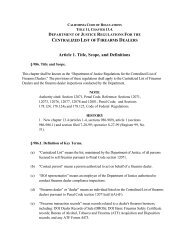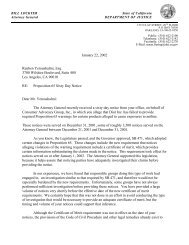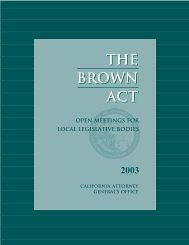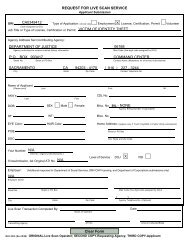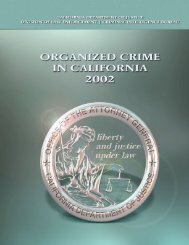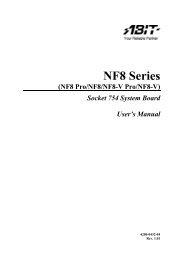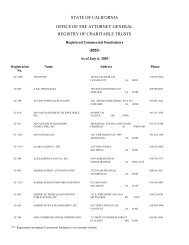Legal Rights of Persons With Disabilities - Ossh.com
Legal Rights of Persons With Disabilities - Ossh.com
Legal Rights of Persons With Disabilities - Ossh.com
You also want an ePaper? Increase the reach of your titles
YUMPU automatically turns print PDFs into web optimized ePapers that Google loves.
$ to see visitors each day;<br />
$ to have reasonable access to telephones to make and receive confidential calls;<br />
$ to receive and send mail, to have access to letter-writing materials and stamps, to receive unopened<br />
correspondence;<br />
$ to refuse electroconvulsive (electroshock) therapy;<br />
$ to refuse behavior modification techniques which cause pain or trauma;<br />
$ to refuse psychosurgery; and<br />
$ to make choices in areas including, but not limited to, their daily living routines, choice <strong>of</strong> <strong>com</strong>panions,<br />
leisure and social activities, and program planning and implementation.<br />
These rights must be prominently posted in a state hospital, <strong>com</strong>munity care facility, or health care<br />
facility both in English and Spanish and other applicable languages. A resident can only be denied these rights<br />
for good cause. (Welf. & Inst. Code, '' 4503 and 4504; Cal. Code Regs., tit. 17, ' 50500 et seq.)<br />
D. Judicial Hearing to End Institutionalization<br />
Any adult with a developmental disability who has been admitted or <strong>com</strong>mitted to a state hospital or<br />
<strong>com</strong>munity care facility has a right to a judicial hearing in order to obtain release from the facility. A request<br />
for release may be made to any staff member <strong>of</strong> the state hospital, <strong>com</strong>munity care facility, or to any employee<br />
<strong>of</strong> a regional center. This individual must notify the court <strong>of</strong> the request for release. (Welf. & Inst. Code, '<br />
4800 et seq.)<br />
Generally, judicial review takes place in a superior court in the county where the facility is located. A<br />
person seeking release has a right to an attorney. If a person does not have an attorney, the court will appoint<br />
one. (Welf. & Inst. Code, ' 4801.)<br />
II.<br />
CIVIL RIGHTS OF PERSONS WITH MENTAL DISABILITIES<br />
A. The Lanterman-Petris-Short (LPS) Act<br />
In 1967, the California Legislature passed the Lanterman-Petris-Short (LPS) Act, which was designed<br />
to define and protect the rights <strong>of</strong> people with mental disabilities, clarify <strong>com</strong>mitment and conservatorship<br />
proceedings, and provide a means for enforcing these rights. (Welf. & Inst. Code,<br />
' 5000 et seq.)<br />
B. <strong>Rights</strong> <strong>of</strong> <strong>Persons</strong> <strong>With</strong> Mental <strong>Disabilities</strong><br />
Individuals with mental disabilities cannot be confined involuntarily if they are not dangerous and can<br />
live safely on their own. (O'Connor v. Donaldson (1975) 422 U.S. 563.) The United States Supreme Court has<br />
held that a person who was confined to a state mental institution against his will and without a hearing could<br />
sue state <strong>of</strong>ficials in federal court under United States Code, title 42, section<br />
70



